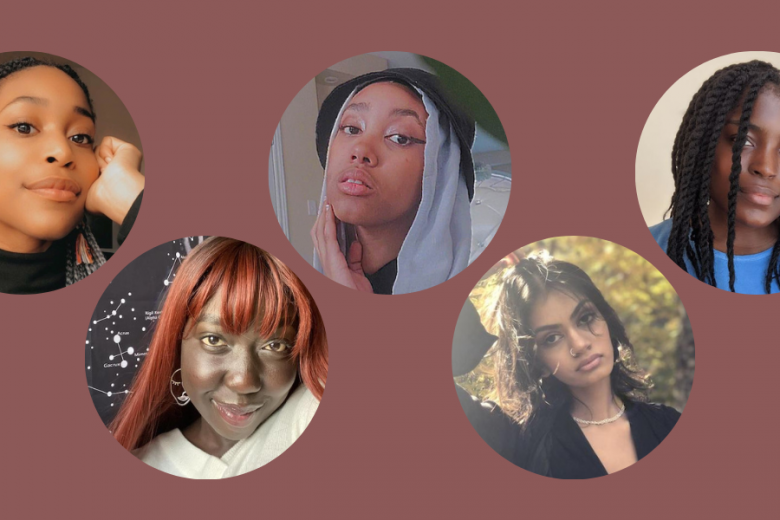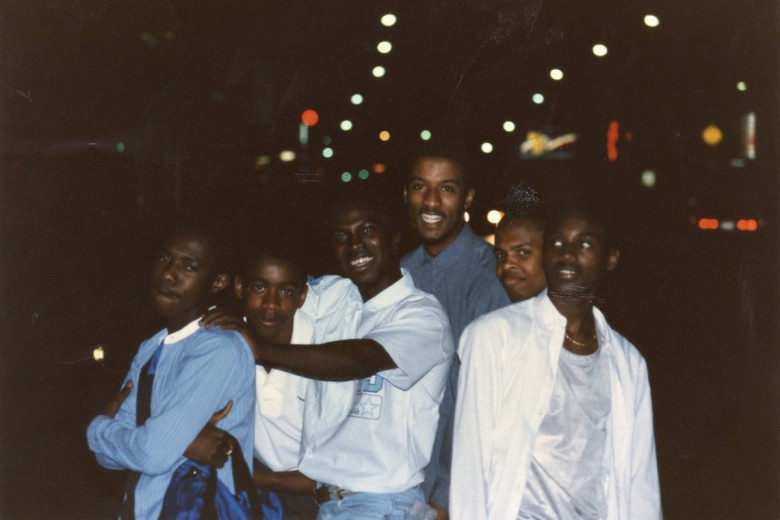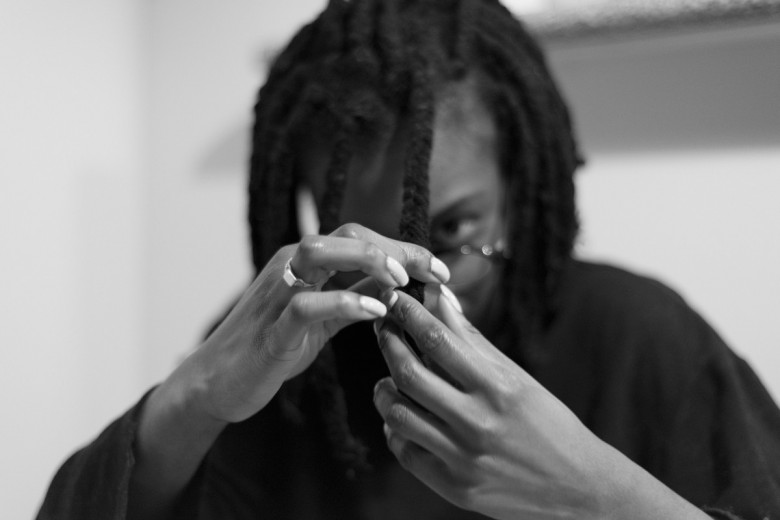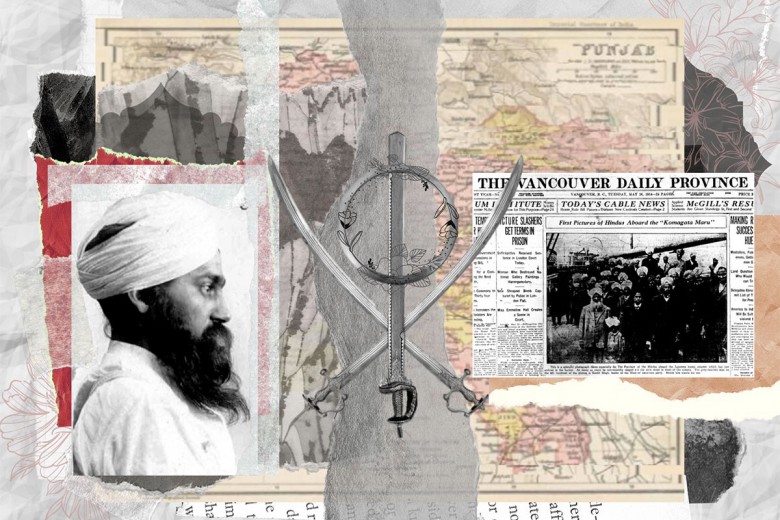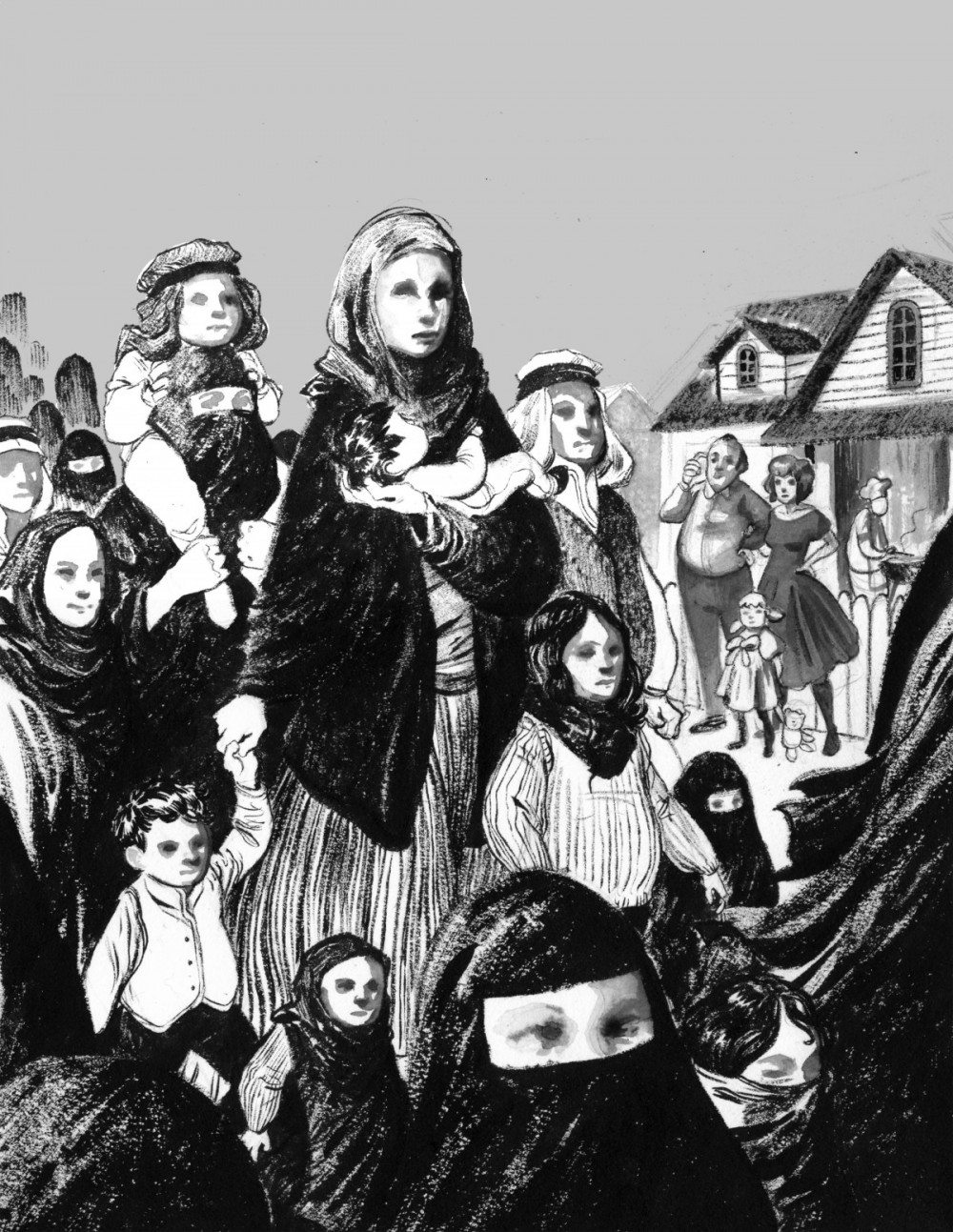
“The social role … of the critic: alert, forceful, undogmatic, ironic, unafraid of orthodoxies and dogmas, respectful of settled uncoercive community, anarchic in his sense of the range of alternatives to the status quo.” — Edward Said
In 2004 Bernard Lewis, the infamous Orientalist and go-to Middle East expert of American empire, casually told the German newspaper Die Welt, “Europe will be Islamic by the end of this century at the very latest.” Uttered rather matter-of-factly, the comment sent immediate shock waves across a Europe and North America already steeped with anti-Muslim and anti-immigrant sentiments. As the last 10 years have made painstakingly evident, imperial interventions in the Middle East and Pakistan have relied heavily on the conflation of the figure of the Muslim, the immigrant/outsider, and the terrorist within mainstream discourse. It is within this context that many have begun raising alarm over the looming demographic threat posed by domestic Muslim population growth. For Lewis and a slew of other writers, such changes offer a stark warning: The Muslims Are Taking Over (and you should be scared)!
As British writer Matthew Carr has pointed out, the threat of civilizational collapse at the hands of Muslims has deep ideological roots in Europe that trace back to the Crusades. But its contemporary manifestation was given a global brand when Egyptian-Jewish writer Giselle Littmann, writing from Switzerland under the pseudonym Bat Ye’or, coined the catchy neologism “Eurabia” in her 2005 publication of a book by the same name. Ye’or is best known as the revisionist historian of abuses suffered by Christian and Jewish populations living under Islamic rule, and her writing has been characterized by “a vitriolic loathing” for Islam matched only by self-styled Canadian Muslim reformer Irshad Manji (in whose 2004 text The Trouble With Islam Ye’or is, unsurprisingly, the favoured footnote).
No fan of nuance (has anyone even used the term “Arabia” since Aladdin?), Ye’or defines the idea of Eurabia as a political project that was precipitated by the opening of Europe to increased Muslim immigration and co-operation with Arab states in a move to strengthen European power against America. This enabled Muslims to establish bases for jihad across Europe’s urban centres, which inaugurated the subjugation of Europe to the agenda of Eurabia. Lest the political loyalties of her argument be unclear, Ye’or’s primary proof for her theory is the spread of anti-Americanism and anti-Zionism (what she crudely labels “Palestinianism, a hate cult against Israel”) across Europe.
British journalist Johann Hari has aptly described Ye’or’s ideas as “a 21st-century Protocols of the Elders of Mecca,” referencing the notorious anti-Semitic text “The Protocols of the Elders of Zion” that describes a Jewish plot for world domination and was widely distributed in Nazi Germany and elsewhere in the early 20th century. In fact, the fear of Eurabia is only one example of the numerous parallels between contemporary Islamophobia and historic anti-Semitism. In Eurabia’s hysterics against Muslim immigration, one might recall the infamous sentiment of the Canadian immigration official asked in 1945 how many Jews would be given refuge in Canada following the war: “None,” he replied, “is too many.”
YE’OR’s IDEAS have spread quickly in a political climate with an immense appetite for the Islamophobic, and although Eurabia’s criers include the list of usual neo-conservative suspects (Niall Ferguson, Robert Spencer, David Horowitz, Daniel Pipes), Carr has noted that “what began as an outlandish conspiracy theory has … moved ever closer towards mainstream respectability.” In January 2006, Canadian columnist Mark Steyn published an editorial in The Wall Street Journal entitled “The Century Ahead: It’s the Demography, Stupid.” The subtitle, “The real reason the West is in danger of extinction,” was echoed in Steyn’s Maclean’s piece “The future belongs to Islam,” excerpted from his book America Alone and published in October of the same year.
Once a renowned theatre critic at progressive British newspaper The Independent, Steyn is the commentator now infamous for adamantly defending Conrad Black, occasionally filling in for conservative shock jock Rush Limbaugh, and defeating a complaint at the Ontario Human Rights Commission filed against him by the Canadian Islamic Congress for the Maclean’s piece in question. With the piece, Steyn introduced Eurabia into popular Canadian discourse. In a predictable yet shocking diatribe, Steyn bemoans “the self-extinction of the races who, for good or ill, shaped the modern world” at the hands of Muslims, both “the fastest-breeding group on the planet” and the population most “at odds with the modern world.”
Although taking Europe as his example, Steyn’s arguments of demographic decline, the unsustainability of the “lavish” social democratic welfare state, and a sense of ennui in the West brought on by too much liberalism, constantly reference North America. It is clear that we too should be worried, for Eurabia is also on our horizon. In the popular tradition of the American right wing, Steyn’s shock-and-awe rhetorical style proudly celebrates colonization, dismisses Africa as AIDS-ridden and tribal, suggests abortion and gay sex are destroying the West, and even offers thinly veiled calls for genocide, as in a discussion of Bosnia where he proposes, “In a democratic age, you can’t buck demography – except through civil war. The Serbs figured that out, as other Continentals will in the years ahead: if you cannot outbreed the enemy, cull ’em.”
Steyn’s writing is so grossly racist that even a mildly liberal audience will surely gasp in horror at its claims. But the fact that his words are repeatedly disseminated in mainstream media is not solely a result of the media’s own moral bankruptcy. In an age of unprecedented global migration, an obsessive anxiety over the alleged problem of demographics has become commonplace.
In January of this year, The Economist published an editorial that opened with the line, “Are Muslims taking over the world, or at a minimum, transforming Europe into Eurabia?” The piece focuses on a recent report of centrist Washington think tank the Pew Research Center that predicts the world’s Muslim population will rise by 35 per cent in the next two decades – twice the rate of the non-Muslim world. Although the Pew report describes itself as “demographic but not political”, it is difficult to decontextualize the findings from the political landscape that accompanies the figure of the Muslim today. The report concludes that European and North American countries will see the largest slice of this projected global increase, predicting the number of Muslims will skyrocket from 2.6 million to 6.2 million in America and from 940,000 to 2.7 million in Canada by 2030.
As The Economist’s immediate citation of Eurabia makes clear, something greater is at stake in these projections than simply statistics. When the international community has aligned itself in a war against an abstraction they call terror, when the language of global violence and destruction has become the exclusive purview of Islamic fundamentalists (and never the secular liberal state), and when the widespread targeting of Muslims has become commonsensical everywhere from national polls to extralegal prisons, it is difficult to consider the prediction that there will soon be millions more Muslims in the West an entirely apolitical one.
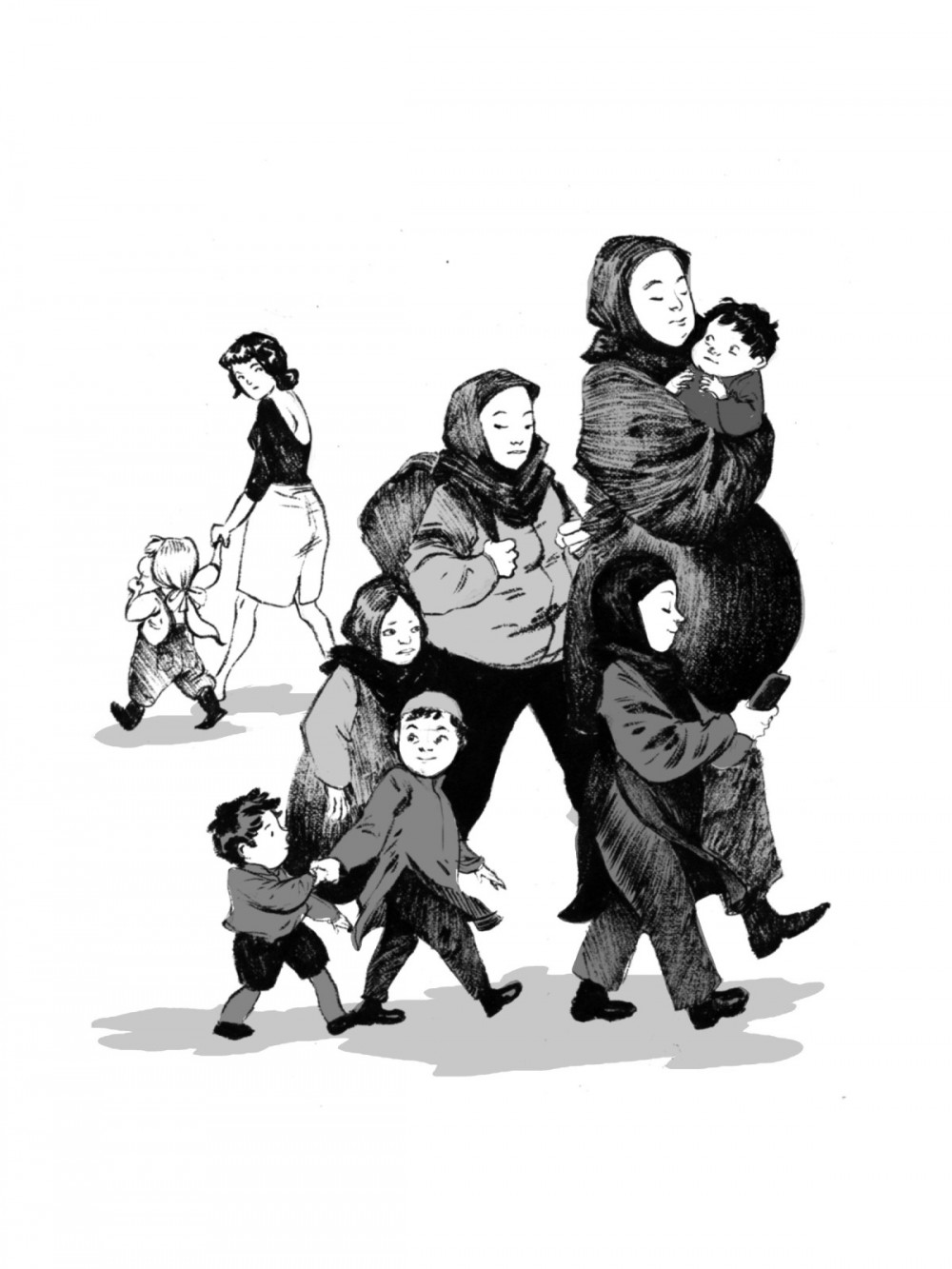
THE NOTION of Eurabia and impending demographic apocalypse has not gone unchallenged. Many have pointed out the statistical flaws in the evidence, and successfully debunked the notion that Muslims (lest it need repeating, an exhaustively diverse population stretching across large chunks of the globe) can be attributed unique reproductive patterns or a growth rate based on religious identity as opposed to more pertinent socio-economic factors. In a response to Steyn in The Globe and Mail, Doug Saunders debunks the myth of Eurabia based on alternative numbers, only to undercut his own argument with the comment, “I agree with Mr. Steyn on one point: Islamic faith is bad for people.” French historian Justin Vaïsse additionally notes that the Muslim population in Europe is often keen to integrate into broader social norms, and “current tensions are part of a normal and democratic process of adjustment.”
Yet beyond the intricacies of how many Muslims are moving where and how often they go to mosque or have premarital sex, it is contextualizing these claims that offers the clearest picture. The myth of Eurabia is only the latest iteration of a long history of xenophobia emanating from “Western civilization.”
As many have argued, the construction of the modern state has always been based on the paradox between the need for immigration – first for the settlement of stolen land (in the North American context) and then as exploitable labour power – and the desire to maintain a purity of national character in the face of difference. Too few immigrants, and the human resources required to uphold industrialized capitalism are at risk; too many, and the hegemonic whiteness of the state is compromised.
From the treatment of Indigenous populations to slavery through to the immigration restrictions of today, governments have enacted a range of policies seeking to exclude undesirables, to prevent certain bodies from marrying and reproducing, deny equal legal rights, institute temporary work programs, selectively choose elite immigrants, and so on. Throughout this process, the threat of an immigrant invasion or internal demographic explosion has been held up as a way to demand citizen allegiance to the state. “They’ll take our jobs, drain our welfare systems, corrupt our gene pools!”, we are told. With Eurabia, the most recent paranoia of the powers that be, we are reminded that fear is the best tool of repression, and that the state will always find a new population to mark as the latest source of threat. It is the role of the left to recognize and name these patterns, and to refuse to accept any logic that constructs hierarchies of human worth, even as we struggle to grapple with new forms of difference around us.
AND YET, some things have changed. Canadian electoral politics of late have been marked by scandals surrounding the highly courted “ethnic vote” – an insulting and insidious phrase that was nonetheless unheard of 10 years ago. I remember the first time an electoral candidate showed up at my mosque in Richmond, B.C. The speech was exceptionally boring, but we all giggled at the nervous man mispronouncing the appropriately courteous Arabic greeting. A few elections later, the mosque even hosted a candidates’ debate for the riding. As the parties vied for this precious community endorsement, I realized that both of us – first-generation immigrant families and long-standing WASP Canadian politicians – likely had a remarkably new understanding of our role in these proceedings, and our strange interconnectedness in the electoral games of multicultural democracy.
Demographic statistics do reveal a certain truth. In the past decade, Canada has seen the internal makeup of its population shift significantly, as all of us who have childhood memories in the country can attest to. When I was in Grade 3, I would lock myself in the bathroom and sob after my hennaed hands were described as diseased by my classmates; by Grade 12, everyone was asking me to apply this ornate form of Indian tattoo at their parties. And never did I expect that in my mid-20s every major newspaper would be full of stories about arranged marriages and detailed expositions of the latest initiative undertaken by the local Muslim school.
These changes may appear trivial, and we know the structural racism of the state only looks better when dressed in ethnic accessories. Certainly the Harper/Kenney duo encapsulates the most vulgar form of legislated discrimination directly alongside such cultural outreach. But it is worth reflecting on how the demographic changes that have occurred may be shifting discourses of xenophobia in the tense arena of what constitutes national identity in a multicultural state.
IN HIS Maclean’s article, Steyn writes, “the modern multicultural state is too watery a concept to bind huge numbers of immigrants to the land of their nominal citizenship … The Western Muslim’s pan-Islamic identity is merely the first great cause in a world where globalized pathologies are taking the place of old-school nationalism.” A June 2006 Economist piece on Muslim immigrants in Europe similarly notes, “It does not help that all Europeans, whatever their origin, nowadays find themselves ‘identity-shopping’ as the European Union competes with older nation-states for their loyalty. No wonder … worldwide Islam tugs hardest at their heart-strings.”
I am struck by a certain change that appears to be happening here: whereas we were once told that immigrants would corrupt national identity and take advantage of all it has to offer – those provisions of social welfare, women’s rights, or queer rights that, it is worth noting, were all won only through struggles against the very powers that now use them to delineate the boundaries of the civilized – we are now told that our embracing of difference has diluted anything that could be considered definitively “national.” Where the nation could once be imagined as a certain sort of community – sharing a language, a favourite pastime, a cultural repertoire, a cuisine, a racialized identity – we are now faced with a crisis that may be less about civilizational clash than civilizational diffusion. And perhaps this is precisely the moment of possibility that we need.
IN A BEAUTIFUL statement that appeared on leftist Indian blog Kafila this past May Day, author Aditya Nigam writes, “Let us, we who have no nation – antinationals, postnationals, aliens, refugees, immigrants, undocumented workers, development refugees – sing the strains of the Internationale. Let us recall the days when the poetry of the Internationale truly belonged to the ‘wretched of the earth.’” As immigration continues and demographic trends rise and fall, it is clear to everyone involved that the rich, industrialized nations of the Western world will continue to see their populations diversify. What will bind the nation together in face of increasing difference, the alarmists ask? And what if nothing will? While we suffer no illusions about the power of the state over those who reside within its borders, what if a nation diffused into difference offers us an opportunity to forge new affiliative ties; political solidarities that begin precisely as “we who have no nation”? Might this afford us the possibility of a left not wrapped up in the logic of liberal democracy and free-market capitalism? We must, as Said says, be respectful of uncoercive communities – even as we sometimes struggle in opposition to their voices – and yet, anarchic in our capacity to imagine. So open the borders, let the Muslims have babies, and let us see where a radical future lies.


